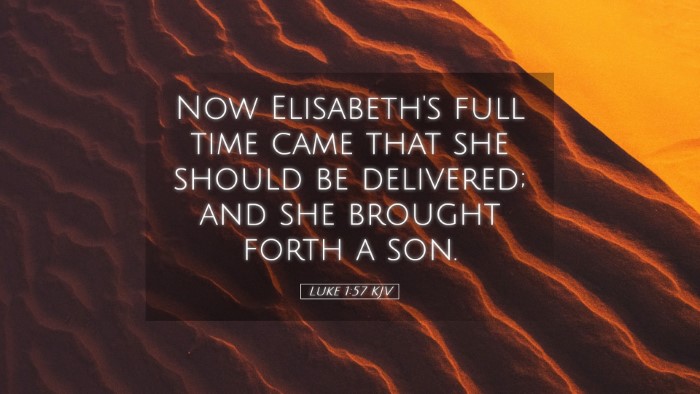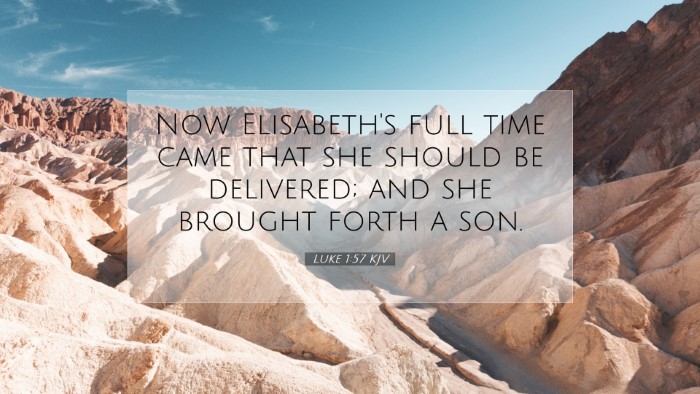Commentary on Luke 1:57
Luke 1:57 states: "Now Elizabeth's full time came that she should be delivered; and she brought forth a son." This verse is pivotal in the narrative surrounding the birth of John the Baptist and encapsulates profound theological implications.
Contextual Overview
The Gospel of Luke opens with the announcement of John the Baptist's birth, which serves as a precursor to the coming of Christ. This narrative not only establishes Elizabeth's fulfillment and joy but also interlinks the divine purpose of both Elizabeth's and Mary's pregnancies.
The Significance of Elizabeth's Pregnancy
- Divine Timing: Matthew Henry emphasizes that God's timing is perfect, and the phrase "full time" indicates the completion of God's divine plan. It confirms that God often acts at just the right moment.
- Preparation for the Messiah: Albert Barnes suggests that John's birth was not merely an isolated event but a significant precursor that prepares the way for the ministry of Jesus, linking the two figures in a prophetic manner.
- Fulfillment of Prophecy: Adam Clarke notes the prophetic aspect of John's birth, aligning it with Old Testament expectations regarding the heralding of the Messiah. Elizabeth's pregnancy symbolizes hope and restoration for Israel.
Theological Insights
Luke 1:57 presents rich theological themes that carry significance for various audiences:
1. The Role of Women in Salvation History
The births of John and Jesus highlight the vital roles of women in God's plan of salvation. Elizabeth's experience: Her pregnancy, after being barren, reflects God's renewing mercy and faithfulness to His covenantal promises.
2. Faith amidst Doubt
This verse can also be seen through the lens of faith amid adversity, as Elizabeth, initially doubtful, is ultimately rewarded for her faithfulness. Both Matthews Henry and Clarke observe that Elizabeth's prior unbelief is transformed into a glorious testimony of faith when she gives birth.
3. God’s Sovereignty
The birth of John illustrates God’s sovereign control over human affairs. Every detail, including the timing of the pregnancy and the birth, was meticulously orchestrated by God. Barnes comments on the divine orchestration in human history, reinforcing that nothing occurs outside of God’s will.
Implications for Ministry and Context
For pastors and theologians, Luke 1:57 serves as an encouragement that God's promises are fulfilled in His timing. This principle significantly applies to ministry, reminding leaders to trust in God's timing and plan as they engage with their congregations and communities.
Encouragement for the Faithful
As believers live through trials and seeming delays, this passage offers hope. The births of both John and Jesus are testaments to the fact that God’s delays are not denials. God remains faithful to His Word.
A Call to Action
The faithful must be reminded that, like Elizabeth, they too may have their lives transformed when they actively participate in God’s redemptive purposes. The responses of Mary and Elizabeth signify acceptance of the divine invitation to be part of His plan.
Conclusion
In conclusion, Luke 1:57 is much more than a passage about childbirth; it heralds a significant moment in the story of redemption, showcases God's faithfulness, and invites believers into a deeper understanding of His plans. As theologians and pastors reflect on this verse, they are encouraged to explore the intersections of time, faith, and divine providence that shape the life of every believer. The importance of this event in Elizabeth’s life echoes through generations, reminding us of the profound joy that comes from God's fulfilled promises.


